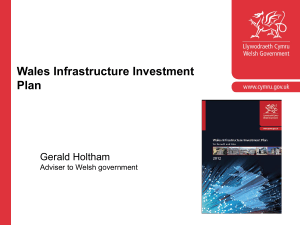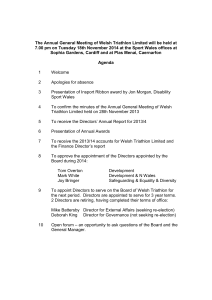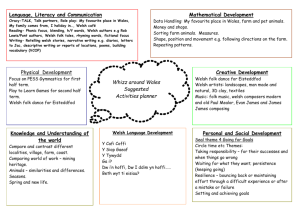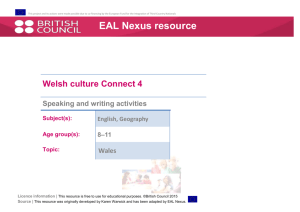Environment Bill Summary of Part 3 and 4
advertisement
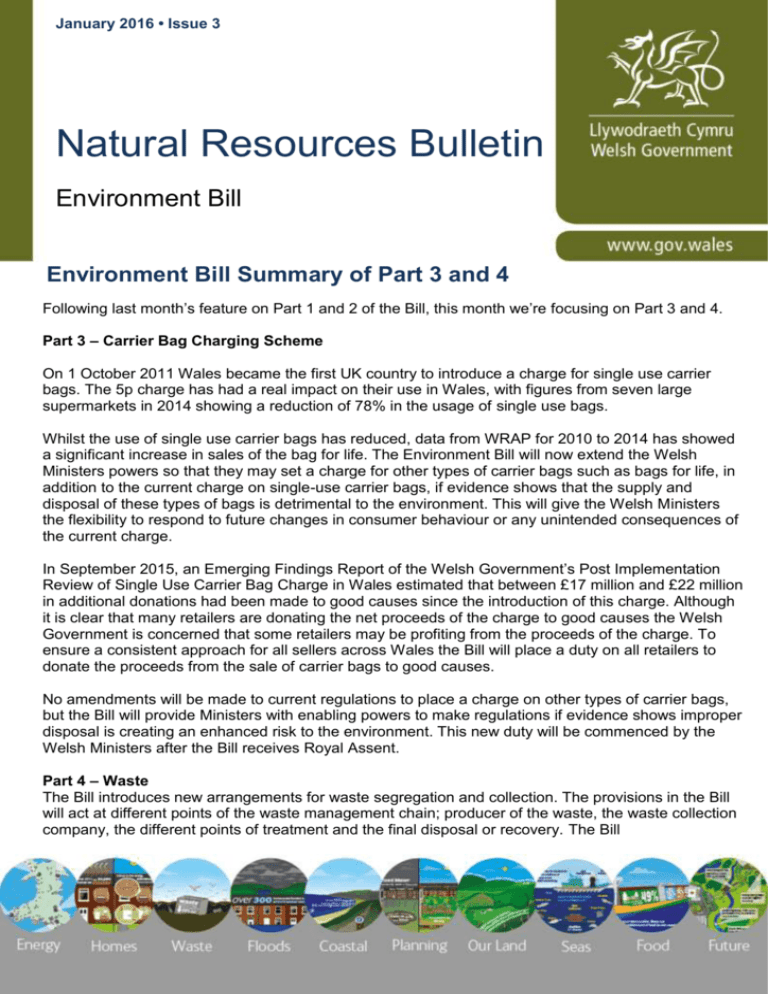
January 2016 • Issue 3 Natural Resources Bulletin Environment Bill Environment Bill Summary of Part 3 and 4 Following last month’s feature on Part 1 and 2 of the Bill, this month we’re focusing on Part 3 and 4. Part 3 – Carrier Bag Charging Scheme On 1 October 2011 Wales became the first UK country to introduce a charge for single use carrier bags. The 5p charge has had a real impact on their use in Wales, with figures from seven large supermarkets in 2014 showing a reduction of 78% in the usage of single use bags. Whilst the use of single use carrier bags has reduced, data from WRAP for 2010 to 2014 has showed a significant increase in sales of the bag for life. The Environment Bill will now extend the Welsh Ministers powers so that they may set a charge for other types of carrier bags such as bags for life, in addition to the current charge on single-use carrier bags, if evidence shows that the supply and disposal of these types of bags is detrimental to the environment. This will give the Welsh Ministers the flexibility to respond to future changes in consumer behaviour or any unintended consequences of the current charge. In September 2015, an Emerging Findings Report of the Welsh Government’s Post Implementation Review of Single Use Carrier Bag Charge in Wales estimated that between £17 million and £22 million in additional donations had been made to good causes since the introduction of this charge. Although it is clear that many retailers are donating the net proceeds of the charge to good causes the Welsh Government is concerned that some retailers may be profiting from the proceeds of the charge. To ensure a consistent approach for all sellers across Wales the Bill will place a duty on all retailers to donate the proceeds from the sale of carrier bags to good causes. No amendments will be made to current regulations to place a charge on other types of carrier bags, but the Bill will provide Ministers with enabling powers to make regulations if evidence shows improper disposal is creating an enhanced risk to the environment. This new duty will be commenced by the Welsh Ministers after the Bill receives Royal Assent. Part 4 – Waste The Bill introduces new arrangements for waste segregation and collection. The provisions in the Bill will act at different points of the waste management chain; producer of the waste, the waste collection company, the different points of treatment and the final disposal or recovery. The Bill Natural Resources Bulletin • November 2015 • Issue 1 will work with landfill bans to ensure valuable materials are recycled. Increased recycling and recovery of waste will decrease pressure on natural resources and help the environment and the economy. The aims of the provisions are; Segregation by businesses and other waste producers such as public sector to ensure clean, uncontaminated recyclable materials are separated before moving on to the next stage in the process. This will reduce costs in waste collection and disposal and increase value of recycled items. Separate collection to ensure a full separate collection service for segregated recyclable materials is available to those that produce waste; this will improve quality of recycled materials and ensure items are not wasted. Energy from waste bans to ensure valuable recyclable materials are not burnt; this will protect the environment by ensuring that only residual waste streams are disposed of in landfill or incinerated. A ban on food disposal to sewer for non-domestic premises to ensure that increased amounts of food waste are available for treatment and use rather than disposal, for example as a source of renewable energy and high quality fertiliser. This will also reduce blockages, sewer flooding, environmental pollution, odours and rodent infestations. There are many benefits to these waste improvements through the Bill; Saving costs to businesses through avoided landfill tax Reducing materials costs and creating jobs in collection and processing Increasing renewable energy from business waste Help drive green growth and develop a circular economy for Wales by Welsh manufacturing businesses using recyclable materials collected in Wales. Reducing greenhouse gas emissions and the ecological footprint of Wales It is expected that regulations to implement the provisions of the Bill will be made after January 2017. To find out more about Natural Resource Management, please follow the link to access our animation. There is also further information on the Bill, including factsheets and an animation on our website, link. You can also keep up to date with developments on Twitter by following #EnvBillWales. Environment Bill progresses towards stage 3 scrutiny in National Assembly Stage 2 was completed on 26 November at the Assembly’s Environment & Sustainability Committee, where the amendments were discussed and voted on. A total of 134 amendments were tabled. The amendments that were agreed by the Committee seek to: Part 1- Sustainable Management of Natural Resources Improve the principles of sustainable management of natural resources in section 4 of the Bill to Natural Resources Bulletin • November 2015 • Issue 1 make clear that the principle of adaptive management includes taking appropriate actions as a response to the outcome of reviews and to ensure that the principles of sustainable management of natural resources include the need to make appropriate actions for public participation in decision-making. Enhance the link between the Well-being goals in the Well-being of Future Generations (Wales) Act 2016 and the objective of sustainable management of natural resources in section 3(2) of the Environment Bill. Include a new sustainable management principle that means causing any serious or irreversible damage to ecosystems must be prevented where applicable (‘the preventive principle’). Replace ‘seek to achieve’ with ‘pursue’ the sustainable management of natural resources in relation to NRW’s purpose. Amend section 7 (biodiversity lists and duty to take steps to maintain and enhance biodiversity), section 9 (duty to prepare and publish a National Natural Resource Policy) and section 10 (area statements) to ensure consistency with the approach taken in the Well-being of Future Generations Act i.e. ‘to take all reasonable steps’. Clarify the timing for the publication of the State of Natural Resources report (SoNaRR) and to ensure that NRW must provide a draft of SoNaRR to the Welsh Ministers before the publication of the final report, in each SoNaRR cycle except the first. Require the Welsh Ministers to set out any risks to sustainably managing natural resources, alongside the key priorities and opportunities. Clarify that National Natural Resource Policy should include biodiversity. Add three additional requirements that NRW must consider before publishing an area statement. Require NRW to monitor report and publish the impacts of any experimental schemes undertaken and to amend the definition of ‘experimental scheme’ in section 23 to highlight that this could include general binding rules. Change the subordinate legislation power in section 24 from the negative to affirmative procedure. Make a link between area statements and the Management Plans for National Parks and Areas of Outstanding Natural Beauty (AONBs). Amend the Planning and Compulsory Purchase Act 2004 to make a link between the Environment Bill and the Planning (Wales) Act 2015. Part 2 - Climate Change Provide the Welsh Ministers with a power to make regulations to vary the 2050 target to a percentage greater than 80%. Natural Resources Bulletin • November 2015 • Issue 1 Specify two interim target years (2030 & 2040) and to require the Welsh Ministers before the end of 2018 to set interim emissions targets for those years. Clarify the linkages between the different statements on progress towards the 2050 target, interim targets and carbon budgets. Require the advisory body to provide its views on progress towards the next interim emission target and the 2050 target and whether the targets are the highest achievable target. Extend the reporting regime for the Welsh Ministers to respond to the report by the advisory body, from 3 months to 6 months. Require the advisory body in advising the Welsh Ministers on the setting or amending of interim targets and carbon budgets to take account of the criteria provided in section 32(3). Require the Welsh Ministers to lay before the National Assembly for Wales a report setting out proposals and policies to compensate for the excess emissions in later budgetary periods, within 3 months after the final carbon budget statement has been laid. Part 3 – Charges for Carrier Bags Removes section 63 which provides a power for the Welsh Ministers to make joint carrier bag regulations with the Secretary of State. Part 4 – Waste Ban the disposal of food waste to sewer, which is a consequential amendment to the Water Industry Act 1991. Part 7 - Land Drainage Include provision to improve the basis of existing charging for Internal Drainage Board functions. A transcript of the session can be found via this link. Stage 3 of the scrutiny process began on 27 November, preparations are now well underway. The Stage 3 plenary debate is expected to take place on 26 January. You can follow the progress of the Bill to see what has happened so far, through the National Assembly for Wales link.



